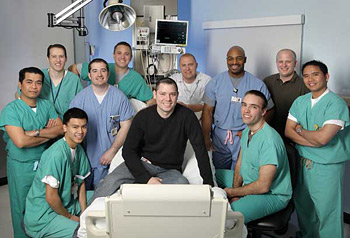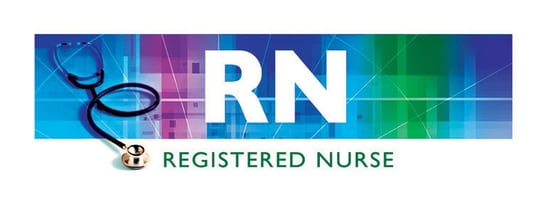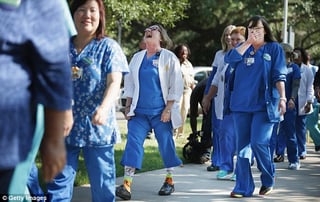 The Nursing profession has traditionally been dominated by women, but more men are entering the field year after year as the dynamics of the healthcare industry change. According to a study by the U.S. Census Bureau, male participation in Nursing has tripled since 1970, and analysts predict this trend will continue as more men are encouraged to enter the profession. Because there are a lot of myths and misconceptions about males in Nursing, male Nurses want their patients, employers and colleagues to know more about them.
The Nursing profession has traditionally been dominated by women, but more men are entering the field year after year as the dynamics of the healthcare industry change. According to a study by the U.S. Census Bureau, male participation in Nursing has tripled since 1970, and analysts predict this trend will continue as more men are encouraged to enter the profession. Because there are a lot of myths and misconceptions about males in Nursing, male Nurses want their patients, employers and colleagues to know more about them.Erica Bettencourt
Recent Posts
 The Nursing profession has traditionally been dominated by women, but more men are entering the field year after year as the dynamics of the healthcare industry change. According to a study by the U.S. Census Bureau, male participation in Nursing has tripled since 1970, and analysts predict this trend will continue as more men are encouraged to enter the profession. Because there are a lot of myths and misconceptions about males in Nursing, male Nurses want their patients, employers and colleagues to know more about them.
The Nursing profession has traditionally been dominated by women, but more men are entering the field year after year as the dynamics of the healthcare industry change. According to a study by the U.S. Census Bureau, male participation in Nursing has tripled since 1970, and analysts predict this trend will continue as more men are encouraged to enter the profession. Because there are a lot of myths and misconceptions about males in Nursing, male Nurses want their patients, employers and colleagues to know more about them.Topics: male nurses
This Mom Wants All Parents To See This So They Don't Make The Same Mistake
Posted by Erica Bettencourt
Thu, Jun 23, 2016 @ 11:41 AM
 Children playing in sprinklers. A fun activity in the summer months. What could go wrong? Read on and find out.
Children playing in sprinklers. A fun activity in the summer months. What could go wrong? Read on and find out.
An Arizona mother wants to warn other parents after her 9-month-old boy was accidentally sprayed with scalding hot water coming from the garden hose, causing second-degree burns to about 30 percent of his body.
Dominique Woodger said she was about to fill a little pool with water on Monday, as she normally does. When she turned on the faucet, the extremely hot water came out of the sprinkler head attached to the hose, getting all over her baby who was sitting on the ground.
"I thought he was crying because he was mad, because he hates when he gets sprayed in the face. I didn't think that it was burning him,” Woodger told ABC News.
Woodger said doctors say her baby will be okay, but she doesn't want other parents or children to experience the same pain.
"It's heartbreaking. It is. It sucks," Woodger said. "All of it was peeling. He had blisters all over the right side."
Parents, please remember to always touch the water from the hose before you spray it on your child.
Related Articles: Practice safety around lakes, swimming pools
Topics: parents, summer safety
Practice safety around lakes, swimming pools
Posted by Erica Bettencourt
Tue, Jun 21, 2016 @ 02:01 PM
 Ahhhh… don’t you love summer? On this 1st day of summer, we think it’s wise to post this article about safety around water. Whether it’s a pool, the ocean, a lake, pond or any body of water, safety is a must. As a mother and lap swimmer, I had my son in the pool at our local Y when he was an infant. Swimming lessons followed soon after. It’s extremely important you know how to swim for safety reasons because you never know when you’ll be in a life or death situation around water. As a Nurse, you’ve unfortunately seen situations with tragic outcomes.
Ahhhh… don’t you love summer? On this 1st day of summer, we think it’s wise to post this article about safety around water. Whether it’s a pool, the ocean, a lake, pond or any body of water, safety is a must. As a mother and lap swimmer, I had my son in the pool at our local Y when he was an infant. Swimming lessons followed soon after. It’s extremely important you know how to swim for safety reasons because you never know when you’ll be in a life or death situation around water. As a Nurse, you’ve unfortunately seen situations with tragic outcomes.
While many parents worry about their children’s safety around swimming pools, as they should and need to do, drowning incidents can also occur in natural bodies of water, says information from the U.S. Swim School Association.
Safety precautions need to be taken around all water environments. According to the Center for Disease Control, about half of all drowning incidents occur in natural water settings such as lakes, rivers or oceans. And, almost 75 percent of people killed in boating accidents die as a result of drowning.
As the summer boating season begins, there are steps parents can be taking to keep their children safer in the water. The U.S. Swim School Association has put together the following guidelines to help keep children safe while boating this summer.
• Make sure your children know how to properly wear a lifejacket. And always have children under 12 wear a life jacket at all times when boating or using personal watercraft.
• Personal floatation devices should always be U.S. Coast Guard approved. Never substitute water wings or other recreational type floating toys for an approved PFD.
• Create a water safety plan for your family and have water emergency drills with your children covering how to recognize the signs of someone struggling in water and what to do in this type of emergency.
• Teach your children the “throw don’t go” rescue method. Instead of entering the water to help a struggling person, teach your child to throw in a rope, reach with a stick, paddle or other object to pull the person in.
• If you take your kids on a shore excursion while boating, be aware of tides and currents and other risks the ocean or beach may have.
• Non-motorized boats can also pose a risk. If your family is canoeing or kayaking be sure your child is wearing a life jacket and knows what to do if the boat flips.
• If your child is playing near a natural body of water and accidentally falls in, teach your child to roll over on his or her back and float until help arrives if exiting the water is not an option.
• Never use floatation devices or water wings to keep your child safe in the water. Rely on your direct supervision.
Swimming lessons are a great addition to help keep your child safer while boating and around open water. For more information about swimming lessons and water safety and to find a Unites States Swim School Association member swim school near you, visit usswimschools.org.
Topics: water safety
At an Orlando hospital, the victims kept coming — but so did an army of nurses
Posted by Erica Bettencourt
Thu, Jun 16, 2016 @ 11:10 AM
 As we are all still grieving the horrific shootings in Orlando, this article points out the hospitals and medical teams who took care of the victims. As staff called co-workers at home and asked them to come in and help with the overwhelming number of patients coming in to the emergency room, the response was “I’ll be right there”. We know our Nurses across the country would respond the same way.
As we are all still grieving the horrific shootings in Orlando, this article points out the hospitals and medical teams who took care of the victims. As staff called co-workers at home and asked them to come in and help with the overwhelming number of patients coming in to the emergency room, the response was “I’ll be right there”. We know our Nurses across the country would respond the same way.
Things started out fairly well, by a busy emergency room’s standards. The Orlando Regional Medical Center had been warned that gunshot victims would be arriving from a nearby gay nightclub, and the first one was conscious, talking and medically stable.
“We didn’t know exactly how many we were going to get,” Dr. Kathryn Bondani recalled Tuesday. “We thought maybe they’re all gonna be like this, and that would be great.”
But then another victim from the mass shooting early Sunday at the Pulse nightclub arrived, and another, and another, in critical condition with devastating injuries. Four or five of the earliest patients died. And then victims kept coming – not always arriving in ambulances, but sometimes in the backs of trucks, sometimes seemingly just appearing in the halls of the hospital, awaiting treatment.
Gunshot victims aren’t an unusual sight at the 75-bed facility in downtown Orlando, nor are they for any trauma center handling the daily chaos of a major American city.
ut on Tuesday, staff at the hospital described what it was like to confront the aftermath of the deadliest mass shooting in modern American history, with one staffer likening it to a “war scene.” Forty-nine victims were killed.
Nine of those victims died “in the first few minutes” after arriving at the Orlando Regional Medical Center, which received 44 victims from the shooting, according to Dr. Michael Cheatham, the hospital’s chief surgeon.
Six of the 27 victims still being treated at the hospital Tuesday were in critical condition, and doctors warned that some may die. Twelve victims were also treated at Florida Hospital in Orlando, where six remained in fair condition.
The victims arrived at Orlando Regional Medical Center in two waves over the course of Sunday morning. There was an initial batch of almost two dozen who arrived shortly after shooting began at 2 a.m. A second group arrived after police confronted and killed the gunman.
Some of the wounds were small, looking like they were from the shooter’s handgun; others were much larger, probably from the shooter’s .223-caliber semiautomatic rifle, according to Joseph Ibrahim, the center’s trauma director.
Some victims looked like they’d been shot from close range. Some looked like they’d been shot while running away. One victim had 11 gunshot wounds; another had four surgeries after arriving Sunday, doctors said. Many of those who died suffered head wounds, they said.
One of the victims taken to the hospital was clubgoer Angel Colon, who was shot three times in the left leg as he ran away from the gunman, and then was trampled by other club patrons trying to escape.
Speaking at Tuesday’s news conference, Colon said his left leg was “shattered” and he couldn’t run, so he lay down and played dead as the gunman began “shooting everyone that’s already dead on the floor.”
“I can just see him shooting at everyone, I can hear the [shots getting] closer, and I look over and he shoots the girl next to me,” Colon said.
“I’m next – I’m dead,” he recalled thinking as the gunman approached.
The gunman shot him in the hip and hand and moved on as Colon tried to show no reaction.
Soon the police arrived, and Colon said he could hear officers trading gunfire with the assailant. Colon saw an officer, and the officer grabbed his hand, saying, “This is the only way I can take you out.” He then dragged Colon out – as broken glass cut Colon’s back and his legs.
“I don’t feel pain, but I just feel all this blood on me, from myself, from my other people,” Colon said. “He just drops me off across the street” – outside a Wendy’s restaurant -- “and I look over, and there’s just bodies everywhere, we’re all in pain.” There, an ambulance took Colon to the safety, and the chaos, of the Orlando Regional Medical Center.
he hospital normally gets alerts from a “very advanced” emergency medical service system that lets hospital workers know when certain patients are headed their way, said Medical Director Gary Parrish. This time, “there was really no advance notice at all.”
As more patients arrived, the on-duty staff began calling more doctors, and more nurses and other staffers, who answered their phones in the middle of the night with a common answer: “I’ll be right there,” according to surgical intensive-care unit director Chadwick Smith.
An army of nurses arrived – dozens who were supposed to be off-duty – along with X-ray and blood technicians as doctors set up a triage to treat the most gravely injured patients, said Bondani. Workers speedily cleaned up operating rooms after the end of one surgery so doctors could immediately begin another. Coordinators responded immediately whenever supplies ran low.
The scene was emotional, with “people in pain, people worrying about their loved ones, people not knowing where their loved ones are,” said Smith.
But doctors said that despite the chaos, the hospital’s emergency plan worked smoothly and efficiently. Aside from the initial patients who died immediately after the shooting, no one else at the hospital had died in the 48 hours since the attack, doctors said.
Smith got emotional at Tuesday’s news conference as he talked about watching hospital staffers arrive in tears to do their jobs.
“It was singularly the worst day of my career, and the best day of my career,” Smith told reporters. “I would think this is probably the same for every person you see standing up here.”
Topics: Orlando Florida
LGBTQ Youth Health: What to Talk About During Pride Month
Posted by Erica Bettencourt
Tue, Jun 07, 2016 @ 12:05 PM
 In honor of LGBTQ – Pride Month, this article touches upon the struggles this community deals with in their personal and professional lives. We all know how important support is from family and friends particularly for teenagers who are questioning who they are attracted to and sometimes, their sexual identity.
In honor of LGBTQ – Pride Month, this article touches upon the struggles this community deals with in their personal and professional lives. We all know how important support is from family and friends particularly for teenagers who are questioning who they are attracted to and sometimes, their sexual identity.
As Nurses dealing with the public all the time, this article talks about the importance of listening, accepting and guiding your family, friends and patients to the right resources. We hope you find it helpful.
While LGBTQ people have enjoyed the benefits of more acceptance from society, LGBT youth remain vulnerable to suicide, homelessness and negative health outcomes. This is largely due to their lack of acceptance from their parent or guardians. In our own practice and in numerous studies, it has been proven that more than anything else, the love and support from parents and families are critical to the health and success of LGBTQ youth.
One of the most tragic cases we have seen was Manuel’s (names and other identifying details have been changed), a 16-year-old Puerto Rican teen who was raised in the South Bronx by his mother. All his life he was taught by his family, culture and society that his future would be defined by a wife and kids, by his ability to support his own family and become the “man” of his house. However, while everyone was telling him who and what he should be doing, he had already started to dream of a very different life. From an early age, he knew he was attracted to men – but he kept his feelings buried for fear his family would disown him if they found out or that his sexuality would bring shame to his family.
One day, his mother went through his cell phone and found text messages from his "best friend" describing how in love they were. His mother put all of her son’s belongings into garbage bags, put them on the curb and told him, “never come back until you like girls!” Manuel became homeless at 16, and with nowhere else to go, he began exchanging sex for money to live. Three years later, he was diagnosed with HIV. When he finally got help, he told his social worker he had two wishes: “That I had been born straight so none of this would have happened, and that my mother believed that I didn’t choose to be this way.”
Now meet Wanda, a 15-year-old African American teen born and raised in Brooklyn by two parents who were actively involved in their church. Every Sunday after church, Wanda and her parents had dinner together and used the time as an informal family meeting where everyone was encouraged to talk openly about their week. While she was sometimes attracted to boys, there was a girl on Wanda’s soccer team that she couldn’t stop thinking about. She tried to ignore her feelings for this girl and put more energy into dating a boy in her class who liked her a lot. One day after church, Wanda’s mother asked her how serious she was about the boy she was dating.
Wanda shrugged that it wasn’t serious, but then she built up the courage to ask her parents: “What would happen if I liked girls, too?” Her parents sat in silence for a few seconds before her father replied, “We would love you no matter who you like.” “Of course we will always love you,” Wanda’s mother said, “but are you sure about this? This is very new for me, so you’re going to have to help us understand this.”
How do you think you would react if your child told you they were LGBTQ? Parents play an extremely important positive or negative role in the lives of their children, especially when children are becoming aware of who they are attracted to or love (sexual orientation) or if they feel themselves to be a male, female or somewhere in between (gender identity). In fact research shows that children whose parents belittle or shame them are more likely to suffer from depression, attempt suicide and have poorer health than children whose parents are supportive.
While you might be afraid that talking about LGBTQ issues with your child will encourage them to be gay or transgender, who they are or who they love is inherent to each person and emerges over time. The best thing for you to do is talk openly and love unconditionally. Don’t be hurt if your child discloses their feelings to someone else first. Most children who are exploring their sexual orientation or gender identity tell a friend, family member or health/mental health professional before they tell their parents because they would rather know for sure before they risk telling their parents.
As a parent, you can emphasize that there's no risk in talking about these things, because you will love your child regardless of their sexual orientation or gender identity – and that you're there for them when they are ready to talk. Being LGBTQ no longer means your child will automatically get HIV or will have a limited life. With pills to prevent HIV and the full range of family options (including marriage) increasingly available to LGBTQ youth, your support is crucial in supporting and accepting your child to emerge as a healthy teen and adult who can achieve their full potential.
While it can be difficult for young people and their families to speak about issues like sex, sexuality and sexual orientation, you are not alone. Many resources exist, such as PFLAG.org (Parents and Friends of Lesbians and Gays), GLSEN.org (Gay, Lesbian and Straight Education Network), Family Acceptance Project (FAP.org) and our program, adolescentaids.org, which provides care for LGBTQ youth as well as HIV care and prevention services. If you know or think your child is LGBTQ, we hope you will use this year’s Pride Month as an opportunity to proudly celebrate your child and help them navigate this wonderful and challenging time known as adolescence.
Related Article: LGBT People In Rural Areas Struggle To Find Good Medical Care

Homeless Veteran Became VA Nurse To Help Others
Posted by Erica Bettencourt
Tue, May 31, 2016 @ 03:53 PM
 Nursing assistant Tom Alligood wears camouflage scrubs during his emergency room shifts at the Dorn VA hospital because he says it helps other veteran patients realize they've "walked over the same dirt," the 62-year-old former Army tanker says.
Nursing assistant Tom Alligood wears camouflage scrubs during his emergency room shifts at the Dorn VA hospital because he says it helps other veteran patients realize they've "walked over the same dirt," the 62-year-old former Army tanker says.
And he doesn't just mean the desert sands of Iraq.
Alligood means homelessness, job loss and the mental anguish of being a long-time military veteran trying to adjust to the trials of a dog-eat-dog, backstabbing civilian world he says nearly ate him alive.
"I need to be around veterans like me. That's where I get my strength, my 'positiveness' from," says the burly former first sergeant who now sports a long, gray braid on his back.
Alligood says he has found a new mission - working in the sprawling Columbia VA hospital and helping as many of his one-time brothers and sisters in arms as he can.
And the VA is looking for more people like Alligood.
In an attempt to respond to the crisis of lengthy patient wait-times and a malfunctioning bureaucracy, VA Secretary Robert McDonald told Congress the agency hired about 14,000 health care workers last year, including 1,300 doctors and 3,600 nurses.
At Dorn, nursing administrator Ruth Mustard said the hospital hired an average of 85 nurses as well as 25 licensed practical nurses and 25 nursing assistants each year for the past two years.
Alligood's background as a military veteran is a plus, she says, and they can always use more like him.
"Veterans know what it takes to serve and what sacrifices they've endured and what some of their challenges have been that have affected their health," the nurse supervisor says.
Alligood said he can relate to his veteran-patients because the route he took from being a VA patient to VA caregiver has been a challenging one.
After leaving the Army, he took a job managing a concrete block plant. The job was eliminated when the plant was sold. Falling deep in debt, Alligood said he took to sleeping in abandoned buildings after losing his car and his home. Life in homeless shelters didn't sit right, either.
"I wasn't in the best of shape, mentally and physically," he said, his rumbling voice catching. "That was the lowest I've ever been."
Alligood said counselors told him about a VA program that put homeless veterans into counseling and back to work. He grabbed the chance to put in 40 hours a week transporting other veterans around the hallways of the sprawling Dorn VA Medical Center in wheelchairs and gurneys.
"It was for $5.15 an hour, minimum wage. But trust me, that $5.15 meant more to me at that time than anything," he recalls.
As he traversed the hospital's maze of corridors, Alligood said he made a point of greeting as many people as he could.
Alligood's banter with other veterans caught Mustard's ear. She told him the VA would pay for his schooling if he wanted to learn to become a certified nursing assistant and come back to help other veterans.
He went back to school and the Florida native returned to the Dorn VA Medical Center, where he's logged three years in an eldercare unit and six years in the emergency department.
"He has a fabulous rapport," Mustard said.
Emergency room nurse Karen Teal says the former first sergeant has a personal touch that put stressed-out patients "instantly at ease."
"He's our jewel," Teal says, beaming at her co-worker.
Alligood said his days in Iraq and Saudi Arabia help him understand veterans who might be dealing with post-traumatic stress disorder. He recounted one veteran he found experiencing a "flashback" in the ER.
"I was able to tell him, 'I got your back, I got your back,'" Alligood said, telling how he'd gotten down on the floor with the ailing veteran, assuring him he'd reached a safe place.
"I don't feel that this is a job for me. I feel that this is a calling, because I get to help so many people," Alligood said.
 This video follows Stephane, RN, MSN, to give us a look into a day in the life of a Pediatric Nurse.
This video follows Stephane, RN, MSN, to give us a look into a day in the life of a Pediatric Nurse.
Stephane, RN, MSN, was originally a business major but, she fell in love with Nursing while in college, and now works as a Pediatric Nurse in a small unit in Connecticut where she cares for young patients.
"What I love about pediatric nursing is the kids. Kids are just so resilient. And even though you're doing all these things that might hurt, just giving them a little bit of comfort and giving them your time can make such a big difference," said Stephane. "You have that one moment where they look at you and they give you a smile -- and it's like everything is okay. That feels really special."
Stephane also said, "You have to keep learning in any profession because things change and in healthcare in particular, things change pretty quickly."
Check out the video below!
 This video follows a Nurse named Keith Koga. He delves into his personal experiences about Nurses and how they inspired him to pursue a career in Nursing. Watch the video below to follow his journey!
This video follows a Nurse named Keith Koga. He delves into his personal experiences about Nurses and how they inspired him to pursue a career in Nursing. Watch the video below to follow his journey!
If you have any questions about becoming a Registered Nurse or anything else about Nursing, just click the image below to ask one of our Nurse Leaders!

Pediatric Nursing is not a field for the faint of heart. You will have times of total heartbreak, and when you think you've seen the worst, a miracle will happen and a child thought to be dying makes a total recovery. You must love children, but be strong enough to handle it when things don't go well and there will be many times they don't.
If you want to pursue Pediatric Nursing and can handle the intensity and emotions, here are some things to consider.
- Education: An Associate's degree with additional classes in child development or a BS in Nursing from a four year college. You must be eligible and pass the RN licensing exam. Requirements may vary by state. Perhaps some work in a day care or school while taking your courses will be helpful.
- Continuing Education: Attend every in-service you can find on child development, work with patients from newborns to adolescents, and communicate with children regularly.
- Experience: After you get licensed, find a job in a pediatricians office or general practitioners office to get some on-the-job experience. If you can get a position in the pediatric unit of a hospital, that would be great. It will give you the best experience. If you want to go on to cancer or neonatal, that's the place to get the knowledge.
What to Expect Daily
Looking at a Pediatric Nursing job on a daily basis depends entirely upon your position. If you're in a PICU, it changes daily and minute-by-minute. In PICU as a rule, you only have one or two patients at a time. The are several reasons for this. The best one being to provide the best quality of care for both the child and the parents. When you're dealing with children in a PICU, the parents become your patients too because of the stress and fear they're feeling. Some responsibilities include going over treatment plans for the children under your care; checking notes from the previous shift; giving medications and checking emergency supplies. Ask the parents if they've noticed any changes or differences in their child.
In a pediatricians office, things for the most part are less intense except for the occasional bout of sheer terror as most children are afraid to go to the doctor. It will be up to you to calm and console them. One day may be devoted to newborns and toddlers. The next day may be teenagers. Children will arrive at the office with a variety of problems from the flu to allergies, bad cuts to broken bones. You'll eventually see it all.
Preparing
It takes a certain personality to be a Pediatric Nurse. Not only do you need to love children, you must also be extremely strong and compassionate. There will be many tears, but if one child is saved, it will be well worth it. Pediatric Nursing has one of the biggest burnout rates of any occupation. There's only so much grief a person can handle.
If you're thinking about becoming a Pediatric Nurse, you should talk to several in your area or online. It's one of the most rewarding jobs in the world, IF you can handle it.
Check out our job database filled with Pediatric Nursing positions. 
Have questions or want to know more about Pediatric Nursing, ask one of our Nurse Leaders by clicking below.






